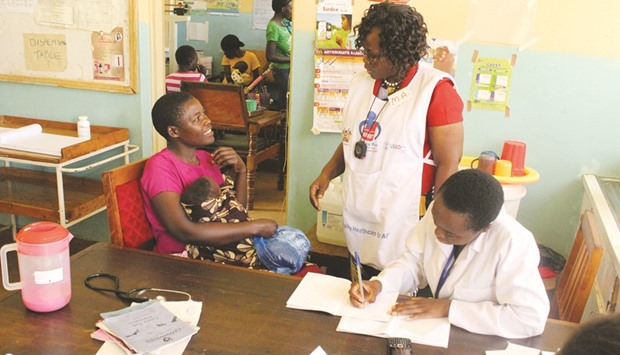A non-profit women’s health organisation in Kenya is confronting an impossible dilemma. Kisumu Medical and Education Trust receives $200,000 per year from the United States government to train doctors to treat postpartum haemorrhaging. KMET also receives money from European donors and other sources to provide comprehensive reproductive health services, including abortion counselling. After US President Donald Trump’s recent executive order reinstating and expanding the so-called “global gag rule,” KMET – and many more organisations like it – will have to choose between life-saving programmes.
The global gag rule, officially known as the Mexico City policy, prevents official US funding for development aid from going to non-US organisations that provide any kind of abortion services to women – even information or referrals – regardless of how those services are financed. Organisations that advocate expanded abortion access in their own countries are also barred from US funding.
This means that, if KMET continues to provide abortion services to women in Kenya, where 30-40% of hospitalisations of women are associated with unsafe abortions, it will lose the funding it needs to perform the similarly lifesaving work of teaching doctors how to handle complications associated with childbirth. Never mind that rates of maternal mortality throughout the region are extremely high. Whichever option it chooses, KMET will be forced to curtail health services in regions where it is the principal provider.
The global gag rule is not new. First introduced by President Ronald Reagan in 1984, it has been a political football ever since, with Democratic presidents rescinding it and Republicans reinstating it.
But this latest manifestation of the rule goes further than its predecessors. Whereas previous versions affected US family-planning funding, Trump’s rule affects all US health aid, including for HIV, malaria, maternal and child health, tuberculosis, and nutrition programmes – up to $9bn per year.
The President’s Emergency Plan for Aids Relief comprises the largest portion of US global health spending, currently $6.8bn per year. Organisations that have long combined PEPFAR aid with other funds to provide comprehensive reproductive healthcare to women living with HIV, and to prevent mother-to-child transmission of HIV, will now be placed in an untenable position.
Even the narrower iterations of the global gag rule backed by previous Republican presidents had devastating consequences. Under George W Bush, the rule forced the closure of eight clinics – most of which were the sole providers of healthcare in their communities – in Kenya alone. Some of these clinics were run by the Family Planning Association of Kenya, which served 56,000 people and did not provide abortions. One of the clinics that was shuttered had been providing comprehensive infant and postpartum care.
But the global gag rule is not just devastating to women’s health; it is actually counter-productive. Without family-planning services, including access to contraception, women are worse equipped to avoid unwanted pregnancies. A Stanford University study found that abortion rates actually increased in countries most affected by the global gag rule during the Bush era.
Trump’s version of the rule threatens to have an even more devastating impact. Over the last few decades, many developing countries – such as Colombia, Nepal, Ethiopia, and Mozambique – have liberalised their abortion laws to save women’s lives and to reduce the costs to their health budgets of treating injuries caused by unsafe abortions. In this sense, the global gag rule undercuts local government policy and interferes with democratic debate.
With the reinstatement of the global gag rule, hard-won progress in women’s health could be stunted, or even reversed, all while violating women’s legal and human rights. For example, if KMET takes US aid, the organisation will be obligated to withhold information from women about a critical health service, breaching the trust between a woman and her healthcare provider and violating a fundamental human right.
In Nigeria, the organisation Education as a Vaccine – a partner of the International Women’s Health Coalition – could face a similarly unmanageable situation if they accept US HIV funding. EVA hosts the country’s longest-running hotline providing sexual and reproductive health information to young people, and is one of the few platforms enabling young people to ask questions without stigma and shame.
Abortion is already highly restricted in Nigeria, and the few abortion providers available face substantial risks. With unsafe abortion a major cause of maternal mortality, particularly among adolescents and young women, the services EVA provides could not be more important. Not surprisingly, EVA’s executive director, Fadekemi Akinfaderin-Agarau, worries that the global gag rule “is going to be a big blow in Nigeria,” because accepting US funding would then impede her organisation’s ability even to discuss post-abortion care with the young women it serves.
Every day, 830 women die during childbirth and pregnancy, and each year, 6.9mn women are treated for complications from unsafe abortion, almost all of them in developing countries. To prohibit funding to organisations committed to providing quality healthcare and information to these women and girls is punitive, and a violation of their human rights. To impose the gag rule despite clear evidence of the harm it causes is a transparent attempt to control women’s bodies and health.
Trump promised during his campaign to punish women who had abortions. That would be bad enough. But the global gag rule goes much further, punishing millions of women throughout the developing world simply for being women. – Project Syndicate
* Françoise Girard is President of the International Women’s Health Coalition.

After Trump’s recent executive order reinstating and expanding the so-called u201cglobal gag rule,u201d KMET u2013 and many more organisations like it u2013 will have to choose between life-saving programmes.
